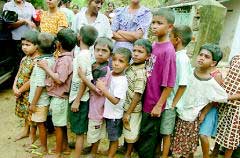 |
|||
|
|
Buddhist temple a makeshift home
By DUSTIN GROVE, WSBT-TV Reporter, Southbend Tribune, Jan 18, 2005
Relief worker assists by shopping for refugees
EGODAUYANA, Sri Lanka -- It is Thursday afternoon at a Buddhist temple in Egodauyana, a small town just south of the capital city of Colombo on Sri Lanka's west coast.
For more than two weeks, the temple has been the makeshift home for 150 families whose houses were washed away in the Dec. 26 tsunami.
 << Jasmine Jacob, a relief worker from Berrien Springs, is helping children all over her native country of Sri Lanka. Here children near Tirrukkovil, Sri Lanka, on the east end of the island nation, wait in line for food and books Jacob is handing out to them. Tribune Photo/JIM RIDER
<< Jasmine Jacob, a relief worker from Berrien Springs, is helping children all over her native country of Sri Lanka. Here children near Tirrukkovil, Sri Lanka, on the east end of the island nation, wait in line for food and books Jacob is handing out to them. Tribune Photo/JIM RIDER
The families spend their days and nights in tents among the monks, missing what used to be, but thankful to have survived at all. Twenty-five of their neighbors did not.
The people here are not starving, but they are hungry for what they used to have. The government, they say, brings the bare minimum, and even that takes time.
Government aid must be marked, checked, sent to distribution centers and finally dropped off at the camps -- proof that even those in a Third World country must endure bureaucratic red tape.
Relief worker Jasmine Jacob has made it part of her mission to bring additional supplies to this camp.
"I'll fill in the gap," she said.
The Sri Lankan native is the co-founder of REACH International in Berrien Springs, a small nonprofit organization dedicated to helping children around the world. REACH stands for Render Effective Aid to Children.
Jacob arrives just before the sun is beginning to set. She walks through the camp greeting dozens of small children with a warm smile and a heavy heart.
Many are either helping prepare dinner or washing clothes. She heads toward the front office with pen and paper in hand, ready to get to work.
"Soy. Rice. Pepper," someone reads from a list as Jacob repeats it, writing each item down. This is her second trip here to buy them groceries.
"They get certain supplies from the government but other (supplies) they don't get," she said. "So I come and instead of bringing them what I think they need, I ask them what they need. They give me a grocery list and I'll go and buy it tonight."
With that, Jacob climbs into her car and her crew heads about 10 miles away to a very busy outdoor city market.
There, hundreds of vendors are shouting out their prices, trying to scream over their neighboring vendors' voices.
Flies are everywhere, so are animals. Dogs roam from stand to stand, some begging for handouts. Across the street, a monkey hops from car top to car top until someone stops and feeds him a fruit.
It is loud and chaotic, a typical Sri Lankan grocery market, several city blocks in size.
In the middle of all of it is Jacob. A bargain shopper, she darts from stand to stand and shop to shop, haggling in her native Sinhalese tongue to get the best deal on the best food. All of the money comes from donations to REACH International.
"Because of the number of children (at the temple), I feel like this is a place I'd like to help," she says.
For more than an hour, Jacob walks the streets and alleys of the market, picking up vegetables, feeling them and buying the best to give those without homes a small piece of their former life.
By sunset, she has purchased more than 200 pounds of food. Cabbage. Rice. Pork. Beans. She bought the food for the equivalent of about 100 American dollars, a very good deal.
The food is packed into the trunk of her sport utility vehicle, ready to be delivered in just a few minutes.
Back at the camp, Jacob and her crew unload the items and store them at the temple. It will last less than a week, but by their smiling faces, the people here -- both young and old -- are clearly grateful.
"It's a lot of work," Jacob said. "But I will come back next week."
|
|
||||
| Point
your feed reader to this location |
||||
|
|
||||
Latest
on the Asian
Tsunami Disaster
|
||||
|
|
||||
|
|
||||
 If you have a prayer for victims of the Asian Tsunami disaster, please Email to us |
||||
|
|
||||
| The
Buddhist Channel Articles Archive |
||||
|
|
||||
| Search the Channel | ||||
|
||||
|
|
||||
| About The Channel | Disclaimer |  |

